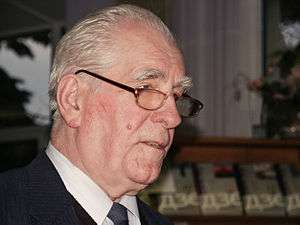Nil Hilevich
Nil Hilevich (Belarusian: Ніл Гілевіч, Nil Hilevič Russian: Nil Gilevich) (September 30, 1931 – March 29, 2016) was a Belarusian poet, a professor in the Belarusian State University, the author of more than 80 books of poetry, publications, and translations, and one of the founders of the Frantsishak Skaryna Belarusian Language Society.[1]

Biography
Nil Hilevich was born in the village of Slabada (Słabada), in the Lahoisk (Łahojsk) District of Mensk Province.[2] He studied in a college in Mensk (from which he graduated in 1951), preparing to be a teacher. During the last year in college he worked as a teacher in one of the schools in Mensk. He continued his education at the Belarusian State University (the Faculty of Philology), and graduated in 1956. During 1960-1986 he was working at the university, and later on became a professor. In 1958 he started to work for a newspaper Zvyazda (Belarusian Звязда). In 1978 Hilevich joined the Communist Party. In 1980 he became the executive secretary of the Writer's Union of BSSR, and held that position for 9 years. In 1989 he became a chairperson of the Frantsishak Skaryna Belarusian Language Society.[3] He also was the chief editor of the Society's bulletin Наша слова (literally: Our Word). In 1991 Nil Hilevich received a People's Poet of Belarus nomination. He has also received some other awards in literature.
Works
Hilevich was first published in 1946. And only after eleven years he published his verse collection, Песьня ў дарогу (literally:Song of the Road). The book was followed by Прадвесьне ідзе па зямлі (literally: A Feeling of Spring Passes over the Earth in 1959), Неспакой (Disquiet; 1961), Бальшак (The Highway; 1965), Перазовы (Exchanges; 1967), А дзе ж тая крынічанька? (And Where is That Little Spring?; 1972), Актавы (Octaves; 1976), У добрай згодзе (In Good Agreement; 1979), Повязь (A Tie; 1987). Hilevich has also published a number of humorous and satirical books, such as
- Званковы валет (The Jack of Diamonds; 1961)
- Да новых венікаў (To New Wreaths; 1963)
- Ці грэх, ці 2 (A Sin or Two; 1970), Як я вучыўся жыць (How I Learnt to Live; 1974)
- Русалка на Нарачы (Mermaid in the Narač; 1974).
Nil Hilevich translates Bulgarian, Slovenian, Polish, Lutuanian, Ukrainian, and Russian prose and poetry into Belarusian. He also has written poetic verses for children, such as
- Сіні домік, сіні дом (Little Blue House, Blue House; 1961)
- Зялёны востраў (The Green Island;1963)
- Добры чалавек (The Good Man; 1981).
In 1981 his chosen works were published in a two part book. Hilevich wrote some plays which were published as a separate book Начлег на бусьлянцы (A Night In The Stork's Nest) in 1980. His novel Перажыўшы вайну (Having Survived the War) was published in 1988.[4] Nil Hilevich is a productive poet, also known for writing a number of books literary criticism, translations folkloric studies such as
- Наша родная песня (Our Native Song; 1968)
- Вусная народная творчасць і сучасная лірычная паэзія ўсходніх і паўднёвых славян (The Folklore And Modern Poetry of The Eastern and Southern Slavic Peoples; 1978).
In 2009 his chosen works were published in a book in Mensk. The book has 600 pages and contains the most important works of Hilevich.[5]
References
- http://charter97.org/be/news/2011/9/30/43173/
- "Archived copy". Archived from the original on 2014-12-24. Retrieved 2012-04-25.CS1 maint: archived copy as title (link)
- http://slounik.org/80925.html
- "Archived copy". Archived from the original on 2014-12-24. Retrieved 2012-04-25.CS1 maint: archived copy as title (link)
- http://nn.by/?c=ar&i=29171